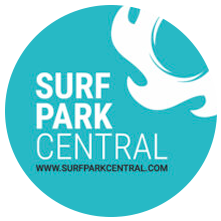By: Anna Dimond

To the naked, wave-loving eye, a typical surf park – no matter how seductive its promise of manufactured paradise, complete with endless, peeling barrels on demand – is environmentally problematic.
First, there’s the water: not only is the sheer size of a wave pool enormous, stretching out like a circumscribed sea, but it demands constant flow to create the waves. Then, there’s the land. Most surf parks, combined with their commercial developments, take up acres of space. Next, there are the countless megawatts of power required to make the magic. Taken together, the very notion of a surf park can seem anti-planet to its core.
Dr. Jess Ponting, however, disagrees. Instead, he believes that, done right, surf parks can not only be built and operate sustainably, but become hubs for education in environmental protection and catalyze sustainability throughout their home communities and beyond. To help the industry reach these goals he has developed a sustainability certification standard and web app specifically designed for surf parks.
STOKE: Measuring Sustainability in Surf Parks
Director of the Center for Surf Research at San Diego State University and an expert in sustainable surf tourism, Ponting teamed up with his former student Carl Kish, a sustainability consultant and designer, to create STOKE Certified, a certification standard for surf and ski resorts, events and destinations. Since 2014, STOKE has grown to service 35 members in 11 countries with a Software as a Service (SaaS) platform that simplifies and expedites working through a comprehensive list of sustainability metrics specifically tailored for the challenges of surf and snow tourism. With the surf park industry at a tipping point, Ponting and Kish have been working behind the scenes with surf park technology companies and developers to develop the STOKE Surf Park Standard which will be released in the coming weeks.
For traditional surf travel businesses, like Fiji’s Tavarua Island Resort, and Costa Rica’s Olas Verdes Hotel, STOKE’s standard includes 192 criteria that start with environmental factors like energy use, water conservation techniques, and waste disposal methods. Yet those, says Ponting, “are just scratching the surface.”
Once a STOKE member completes a benchmark against the STOKE standard, a process that takes less than an hour answering a series of questions posed by the STOKE SaaS platform, they know where they stand and what kinds of initiatives they need to put in place to reach compliance at one of three levels: certified, sustainable, or best practice. When a member is ready an onsite evaluation is organized with a third party sustainability specialist and if everything checks out, the member is certified. Metrics include everything from whether a company harvests rainwater, how many women are on its payroll, proactive guest education about local indigenous culture, where produce is purchased, and a resort’s coral conservation efforts.
STOKE Certification Goes Beyond Energy, Water and Waste
Another significant component of STOKE’s formula is pro-planet evangelism. The company measures baselines like energy and water use, but goes much further. Its evaluations consider supply chains, equity in staffing, working conditions, conservation and marketing of the sustainability message. This, says Ponting, is where surf parks – typically inland, close to cities, and proliferating quickly – can play an important role. As wave pools and their attendant developments increasingly crop up in places from Switzerland to São Paulo, STOKE is adapting its surf certification system to the human-made milieu, where marketing can make an even bigger impact, potentially, than at remote resorts.

“If a surf park is STOKE Certified at a high level, they’re going to be representing innovative practices that are then communicated to the people who visit there,” says Ponting. “Visitors learn about these sustainability practices, and hopefully plug them into a broader community of people who care about it, too.”
For more on surf park sustainability, check out our Surf Park Summit Roundtable Discussion with Chris Hines, Nick Hounsfield, Chad Nelson, and Derek Sabori.
Advocating for the Revitalization of Abandoned Landscapes
STOKE’s certification for surf parks closely resembles that for coastal surf reports and operators. Where they diverge is, ideally, during the planning phase, starting with site location. Surf Snowdonia in the north of Wales, for example, was built on the contaminated site of an old aluminum smelter. By the time Snowdonia’s developers scoped it out, the smelter was long gone and the town was economically depressed. The company partnered with the Welsh government to clean up the site and construct the park. Now, with added attractions like a zip line and a skate park, tourism has helped the community rebound.

Elsewhere, says Ponting, Melbourne, Australia’s URBNSURF utilizes industrial land adjacent to Melbourne’s Tullamarine Airport and recycles water from its concrete apron. URBNSURF’s forthcoming Sydney surf park will occupy land originally developed to host the 2000 Olympic Games. DSRT Surf in California, meanwhile, participates in a “turf for surf” landscaping program that sees non essential turf at the adjacent golf course replaced with xeriscaping that will permanently reduces golf course water use 24 million gallons each year, zeroing out the surf park’s water use.
That’s about, says Ponting, what it takes to maintain 1.3 holes of a Coachella Valley golf course for one year.
“For most sustainability issues, there are creative solutions,” he says. “What we do at STOKE is help our members identify the issues and find sustainable solutions for the tricky parts of what they do, and to prioritize sustainability in all the decisions that need to be made at every stage of development. If you prioritize sustainability every time you can have surprisingly good outcomes.”
Those outcomes, ultimately, support Ponting’s long-term goal of changing the course of climate change – and with it, our sustainability as a modern society. Lofty? Perhaps. Worthwhile? Without question.
“That’s how we start to change perceptions on a large scale,” he says. “The mission of STOKE is to do just that, both from changing the way our member businesses do what they do and then educating consumers to care about what the businesses are doing. That way we all evolve.”
Want exclusive Surf Park Central content? Join Surf Park Insiders and get FREE access to our Surf Park Summit.
























You must be logged in to post a comment Login